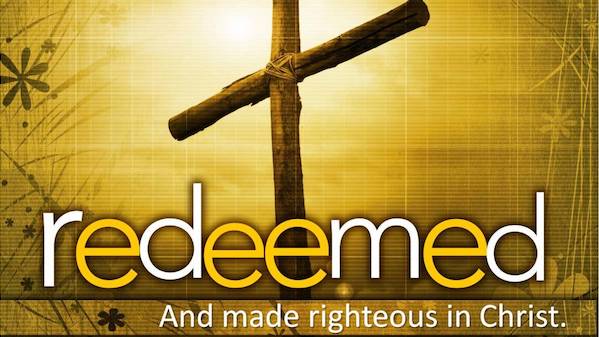
Righteousness. The word and concept bring so many interpretations and feelings that it has become a complicated subject. For many well-meaning people, including Christians, it is a moral code to live up to to make the world a better place. To others in an increasingly post-modern world, it is a stuffy, old-fashioned idea that speaks about a haughty sense of superiority. As Christians, we cannot push this subject aside, for it is a central one in our faith; how then do we come to a Christian understanding of righteousness?
First, we can look to God Himself. In the Bible, it is clear that of the many attributes ascribed to God, righteousness is one of the most prominent. Within it, we find His holiness, justice, and perfection. Because God is righteous, we know His will and ways are always good, true, and life-affirming.

In the Old Testament, we see God’s righteousness through His faithfulness in the covenant He made with the Israelites. God initiated the covenant, kept His side of it, and blessed the people. Indeed, Israel depended on God faithfully fulfilling His promises to guide, protect, and keep the nation from harm. The righteousness of God was a living reality that the people depended on for survival and prosperity, and it was not just an abstract concept. Whenever the people abandoned God and wandered away, they opened themselves to the enemies around them and reckoned with a new political reality in exile.
In Old Testament times, the covenant terms presented by God were to be obeyed, and in cases of failure, repentance was required. Obedience led to blessing, and blessing is a sign of righteousness. Likewise, persistent disobedience would lead to judgment, which was the opposite of blessing. The Old Testament prophets had an understanding of righteousness as an ethical code; Amos with doing justice (Amos 5:24), Hosea with loving-kindness and mercy (Hosea 2:19), and Isaiah with faithfulness (Isaiah 1:26).
Many many years ago, God had initiated a covenant through Abraham. It was a covenant of blessing. Since the days of Adam, God’s righteousness has been an active reach-out, a lifeline to save and restore our fellowship with Him. Sadly, the Israelites often fell away from God, and the sad, repetitive cycle would repeat. God’s character is righteous, but unlike the picture many today have of this attribute, God’s righteousness is at one with His justice, mercy, kindness, effort, and sacrifice. From this very heart would come the ultimate sacrifice.

In Romans 5:19, Paul wrote:
19 For just as through the disobedience of the one man the many were made sinners, so also through the obedience of the one man the many will be made righteous.
When Jesus came, He brought with Him a mission that would culminate in a new covenant that opened a direct relationship between God and us. Jesus was holy and righteous, and He embodied this righteousness as He announced and taught about the approaching kingdom of God. He did not say He abolished the Law but that He came to fulfill it.
When He made the sacrifice on Calvary Hill, He bore the sins of the world, completely satisfying God’s righteous demands. This is the good news at the core of the gospel and the Bible’s message. The righteousness of God had been made into a gift for all people through faith in Jesus Christ.

We find something truly significant in this momentous occasion. Being “made righteous” is no longer something people do or perform to ‘find God’ or earn His approval. It was the remarkable act of God initiating, acting upon it, and declaring that we have been made righteous and freed from sin’s penalty. God declared it, and it is done. Those in Christ now have a restored and direct relationship with God. Nevertheless, because God is righteous, there is still an ethical element to the Christian understanding of righteousness.
The ethical side of righteousness was still being noted after the church was born. In Acts 10:35, it was stated that in every nation, those who “fear Him and works righteousness” are accepted by Him. James wrote that “faith without work is dead.” How do we reconcile this seeming disparity with the free gift of grace? The gift of grace was free, but it was not a cheap thing. There was immense pressure by those who were not in Christ on the early Christians. It often required strength and resilience of commitment for the early Christians to remain faithful to God.
Paul, through his letters, is the primary expositor of the meaning of righteousness. The righteousness we need for our salvation does not come from ethical behavior but from the sacrifice Christ made for us on Calvary. We do not need to strive anymore. To receive righteousness is more than just a verbal thing. It is to be changed, transformed, and born anew in God’s Spirit. God’s righteousness becomes a quality to learn and enact, and we become the living temple of God. It is not a moral code but a transformation of the mind (Romans 12:1-2). In a response born out of gratitude, faith, and relationship with Christ, we want to live righteously. Works – and a Godly (what some people might call ‘ethical’) lifestyle – then is a supernatural fruit of the Spirit in us, not a code or standard to achieve to be saved.

The Bible promises that all our worries, anxiety, and other concerns of life will be taken care of as we make righteousness a priority. As we care about God, God has promised that He will care for us (Matthew 6:33). At the end of history, when we are with Christ in the new heaven and earth, where righteousness dwells (2 Peter 3:13), those promises will be made more apparent, visible, and pure.
NOTE: This reflection was guided extensively by Mark Fackler’s book ‘Big Ideas of the Bible’.
|Share The Good News|




Leave a Reply